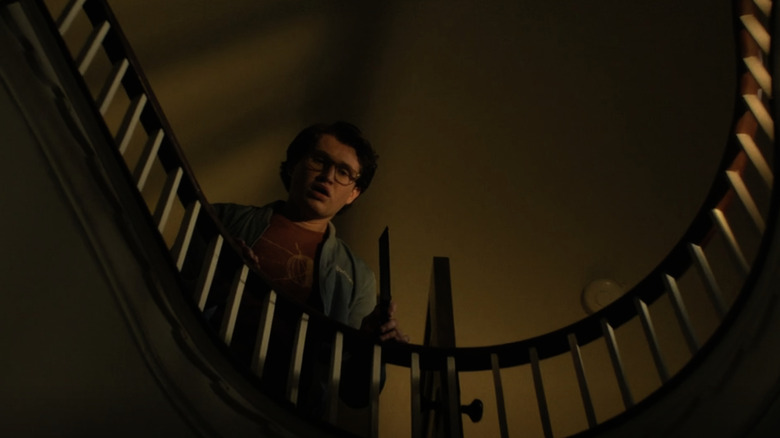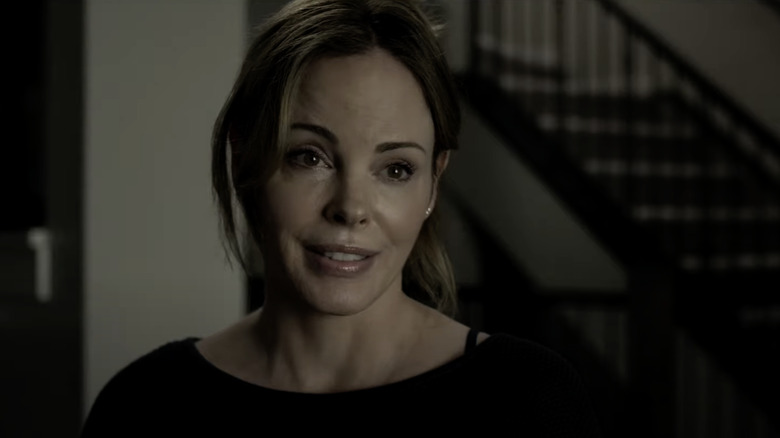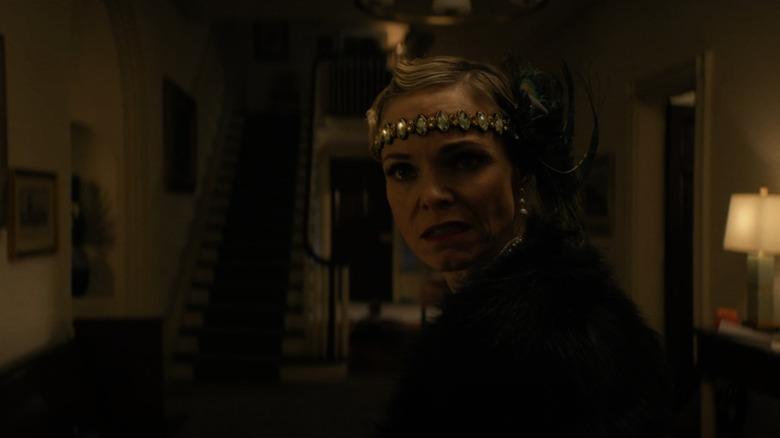Halloween Ends Kicks Off Its Kills With An Homage To An Underseen Indie Horror Movie
This article contains minor spoilers for "Halloween Ends."
Corey Cunningham (Rohan Campbell) is the name on every horror fan's lips right now. He's the surprise, breakout character of David Gordon Green's final chapter in his reboot trilogy, "Halloween Ends." Sure, Green's trilogy might be an uneven, thematically inconsistent set of films, but Green certainly deserves some brownie points for taking large risks in his attempts to innovate the "Halloween" franchise.
In "Ends," the huge risk is centering its story away from just Laurie Strode (Jamie Lee Curtis) and Michael Myers (James Jude Courtney), and exploring Haddonfield's festering anger through a new conduit. Laurie sees something in Corey's eyes, something dark and distant, something evil — not unlike her boogeyman before him. Green makes a large effort to portray Corey's descent into evil through visual parallels with Michael Myers. He stands by the bush and stares at Laurie the way Myers did all those years ago, dons a similar jumpsuit, and possesses the same internal hatred for Haddonfield.
One of the bolder creative choices Green made to re-center Corey as the heart of the story was dedicating the intro to Corey's ultimate, formative trauma — the night he accidentally killed Jeremy (Jaxon Goldenberg), a young boy he was babysitting, by knocking him down a long flight of stairs. It's a memorable kill that immediately kicks off "Ends" and its nihilistic tone, but did you catch the scene's striking similarity to one in a lesser-known indie horror flick, "Z"?
One horrific hook, two different approaches.
Now released as a Shudder streaming original, Brandon Christensen's imaginary friend horror film "Z" first premiered at the Overlook horror fest. One scene, in particular, got the biggest response out of any scare in the film, the scene where a child, Daniel (Fox Rose) falls down a flight of stairs and hits a railing behind his mother. Sound familiar?
While the imagery of the scene and the gut punch is similar, it's interesting to see how wildly different the two are in context. In "Z," it's an especially shocking moment because it is played nonchalantly. As Daniel goes up the stairs, his mother Georgia (Chandra West) worriedly tells him to be careful and it is left at that. There's a minor parental fear in her voice, but nothing else in the scene foreshadows Daniel's bloody fate. When it happens, mid-conversation between the protagonist Beth (Keegan Connor Tracy), it's totally out of left field, and that's particularly why it's so effective.
Back to "Halloween Ends," this moment where Jeremy falls down the stair railing is a climactic payoff to a horrific situation. After some childish teasing about Michael Myers, Jeremy disappears from the living room. All of a sudden, Corey hears screams for help from the attic. With the best intentions, Corey walks up there to help Jeremy, but it was actually a trap — Jeremy locks Corey in the attic and laughs at his misery. As Jeremy's parents arrive home, Corey kicks the door open with brute force, which sends Jeremy down the flight of stairs to his death. These scenes have the same hook, with two very different approaches to the suspense.
There's a strangely relatable fear provoked by the scene compared to usual slasher fare
Not to diminish the trauma and guilt that looms over Corey for the remainder of "Halloween Ends," but one tonal connection between these two scenes is that some audience members would feel an impulse to laugh as much as they gasp in horror. When "Z" premiered on Shudder, the falling scene was shared on r/ChildrenFallingOver for its comedic value. Personally, when I saw "Halloween Ends" in theaters with a crowd, there was an uproar in laughter when the scene happened.
Is it wrong to laugh at these scenes? Of course not. Laughter is a natural response to the shocking and unexpected. And what's so ghoulish about these scenes and the way they handle their kills is that it's not coming from a typical, over-the-top slasher murder, these scenes are horrifying ultimately because they're tangible in reality. It might be a leap of logic to expect to be stalked and killed by an indestructible boogeyman, but anyone can accidentally fall down a long flight of stairs on the wrong day.
John Carpenter's original "Halloween" once brought horror to the average American Suburban lifestyle, and in a way, Green's "Halloween Ends" brought that specific fear back in a roundabout, shocking way.


